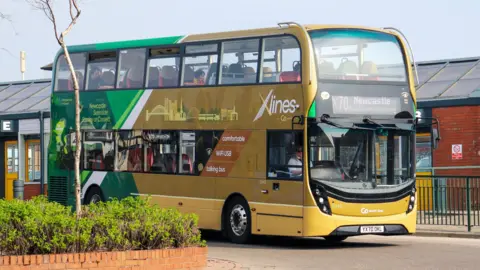Polluting older buses 'offset' green benefits
 Go North East
Go North EastThere have been calls to speed up the introduction of newer, less polluting busses as figures revealed around 40% do not meet higher emissions standards.
While 60% of regular buses in north-east England meet the higher Euro VI engine standards, the rest have been described as offsetting some of the benefits of pollution reduction efforts.
Regional mayor Kim McGuinness, whose responsibilities include local transport, said she wanted every bus in the region to be zero emission within 10 years.
Bus companies Go North East and Arriva North East said they were investing in new vehicles. Stagecoach has been approached for comment.
In response to a freedom of information request, the North East Combined Authority (NECA) said its latest statistics on the issue were dated to February 2024 and it could only provide data for the area's three major bus firms.
Additionally, 15% of buses in the region were operated by smaller companies for which it did not have figures.
Of the big three, NECA said 33% of vehicles complied with the older Euro V engine standards rather than the latest Euro VI mark, but a further 6% had more outdated engines.
 NECA
NECAProf Anil Namdeo, from Northumbria University, said: "Hybrid and electric buses are the way to go, but that requires commitment from the local and combined authorities."
Mayor McGuinness said by March 2026 there would be 113 electric buses across the region, making up about a 10th of the entire fleet.
She called on bus firms to speed up plans to bring in greener vehicles, adding she wants to introduce "binding targets".
Prof Prashant Kumar, at the University of Surrey, said nitrogen oxide (NOx) emissions produced by vehicles which were Euro V compliant or lower were likely to be "substantial".
"The continued presence of older, higher emitting buses significantly offsets the benefits of newer Euro VI and electric vehicles," he said.
Nitrogen oxide can cause a range of respiratory and cardiovascular health problems, especially for those with pre-existing conditions like asthma and heart disease.
Prof Jill Belch from Dundee University said children in particular experience ill effects at lower levels than adults.
"Environmental air pollution is a major determinant of childhood asthma," she said.
